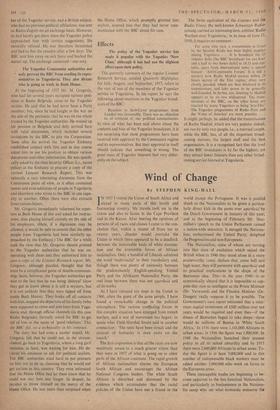Effects The policy of the Yugoilav service Nis made it
popular with the Yugoslav 'New Class,' although it hal had not the slightest effect upon their policy.
The quarterly summary of the regular Listener Research Service, entitled Quarterly Highlights, for July, August, and September, 1957, refers to the visit of one of the members of the Yugoslav service to Yugoslavia. In his report he says the following about reactions to the Yugoslav broad- casts of the BBC: Reaction to Seth-Croat programmes from London was favourable. There was no objection to, or criticism of, our political commentaries. In view of what has been said above about the contents and bias of the Yugoslav broadcasts, it is not surprising that these programmes have been received with approval by the Communist regime and its representatives. But their approval in itself should indicate that something is wrong. The great mass of Yugoslav listeners feel very differ- ently on the subject. The Swiss equivalent of the Listener and the Radio Times, the well-known Schweitzer Radio- zeitung,,carried an interesting item, entitled 'Radio Warfare over Yugoslavia,' in its issue of June 13, 1958; it requires no comment : For some time past, a transmission .in Croat by the Spanish Radio has been highly popular among Yugo-slays. . . . It is broadcast for 15 minutes daily [the BBC broadcasts for one hour and a half to two hours daily] at 18.15 and con- tains, apart from international news, a special feature: 'Anti-Communist Forum.' It is still a mystery how Radio Madrid secures within 24 hours secrets of the Tito regime, often very closely guarded, which arc then disclosed in its transmissions, and later prove to be generally well-founded. In Serbia, too, listening to Madrid appears to be no less widespread. The trans- missions of the BBC. on the other hand, arc rejected by many Yugoslays as being 'pro-Tito.' The Yugoslav programmes of Radio Paris and the 'Voice of America' arc more popular. . .
It might, perhaps, be added that the transmissions of Radio Madrid, which are very popular indeed, are run by only two people, i.e., a married couple, while the BBC has, of all the important broad- casting stations, the largest staff and the best organisation. It is a recognised fact that the level of the BBC broadcasts is by far the highest; yet they attract fewer listeners than any other broad- casting service beamed at Yugoslavia.










































 Previous page
Previous page